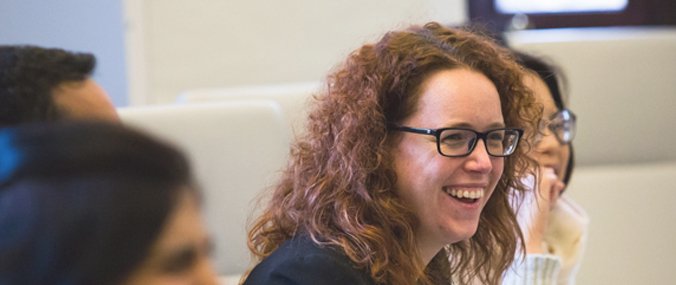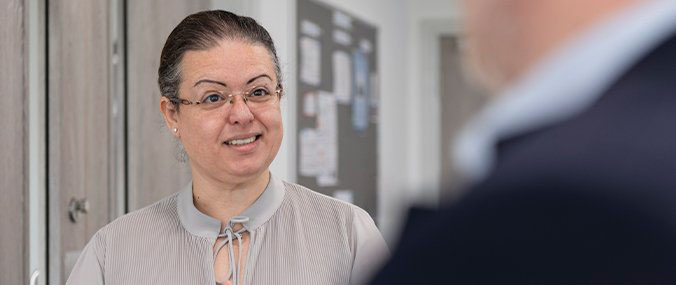General practice allows you to combine clinical practice with other interests such as politics, research, and medical education. Or, perhaps you wish to develop an extended role by providing an additional specialist service in your community, or go further afield in a wide range of clinical areas from cardiology, dermatology, and minor surgery to mental and sexual health.
Developing a portfolio career
"Portfolio GP" is a term which commonly describes a GP who holds multiple roles. Most GPs will have a primary clinical role - as locum, salaried or partner GP - and it's becoming common to see members taking on additional roles alongside this to diversify their skills and experiences.
Hosted by Dr Sophie Lumley, a First5 salaried GP and Training Programme Director in Shropshire, the GP+ Careers podcast is a series of short interviews with a standardised format. It's designed to point people in the right direction and showcase what’s possible. Sophie will ask a series of questions to each of her guests about what their role entails, how they got into it, and any top tips they have for those considering a similar path.
You can look forward to the release of a new podcast episode each month, available exclusively here and through all main podcast platforms. Browse this page to explore and listen.
Latest episode: GP+ Dermatology
In this episode of the GP+ Careers podcast, Sophie interviews Dr John Diamond, a GP based in Northern Ireland as he shares his journey of developing an extended role in dermatology to tackle Northern Ireland’s multi-year secondary care waiting lists. Drawing on his experience with the Cardiff diploma and the GPECs elective service, he provides practical advice on finding a clinical "spark," collaborating with colleagues, and starting small within your own practice.
"The satisfaction I get comes from helping patients I know would otherwise face long waiting lists, and actually fixing the problem and making them better. I can think of dozens of patients where that’s happened: people with severe eczema, acne or psoriasis, or a rash no one else could diagnose. Because of my additional knowledge, I’ve been able to identify the condition and treat it. That gives me huge satisfaction."
Top Tips
Establish your foundation first
Spend your first four or five years in general practice settling into the business of partnership and getting to know your patient population before pursuing a specialised niche.
Invest in formal, high-quality qualifications
Pursue specialised education, such as the Cardiff diploma in practical dermatology, but be prepared for the time commitment; a rigorous academic diploma can require approximately 10 hours of study per week for a full year.
Observe secondary care clinics voluntarily
Before investing heavily, reach out to local consultants and ask to sit in on their clinics. As dermatology is highly visual, this firsthand exposure helps you determine if the discipline, which offers a "clean" break from complex social or mental health issues, truly suits you.
Collaborate to build services
Avoid working in isolation; instead, gather a group of like-minded colleagues. Pair with those who have complementary strengths, particularly those skilled at lobbying for funding and navigating administrative hurdles, as their persistence is often what gets a service off the ground.
Start small and focus on patient impact
You don't need a regional service to be effective; simply enhancing skills for your own practice list is invaluable. Addressing inflammatory conditions locally provides immediate relief to patients who might otherwise face secondary care waiting lists as long as six or seven years.
GP+ Child Health
This episode of the GP+ Careers podcast features Dr. Amina Al-Yassin, a First5 GP who has built a dynamic portfolio focused on child health. Dr Al-Yassin details her experience balancing clinical sessions with strategic leadership roles at Barnardo’s and as a Clinical Lead for local children’s services. Listeners will discover how to navigate spin fellowships, engage with community Child Health Hubs, and leverage their unique GP skills in specialist settings like CAMHS.
"The highlight of my role is the ability to transform systemic failures into proactive solutions that improve care on a population level. For instance, after a tragic childhood asthma death in my borough, we were able to use our strategic position as a borough clinical leadership team to develop a locally enhanced service (LES) to ensure such gaps are closed for other families. It is incredibly rewarding that when we identify a problem in the system, we have the platform to find creative ways to make a difference and launch clinics that directly benefit our community."
Top Tips
Leverage spin fellowships for protected time
If you are early in your career, look into spin fellowships. These schemes are designed to improve GP retention by providing protected time (usually one or two sessions a week) to develop a special interest or an extended role. Dr Al-Yassin used this to work within a Child and Adolescent Mental Health Service (CAMHS), gaining frontline experience in neurodevelopmental assessments and medication management. This protected headspace is helpful when first developing a new area of expertise.
Prioritise practical experience over formal certificates
While additional qualifications like the Diploma in Child Health or the Diploma in Child and Adolescent Mental Health are available, they are not always prerequisites for extended roles. Dr Al-Yassin emphasizes that the skills you already possess as a GP i.e. being well-versed in both physical and mental health across all ages, are unique and highly valuable. Learning on the job, showing enthusiasm, and maintaining a holistic perspective often count for more than a certificate.
Engage with local Child Health hubs
Investigate whether your local area or Integrated Care Board (ICB) has established child health hubs. These are community-based clinics where paediatricians and GPs work together in the same room to provide specialist input for families. If you cannot work in one immediately, ask to sit in on clinics or participate in their virtual Multi-Disciplinary Team (MDT) meetings, which often include health visitors, school nurses, and therapists.
Connect through Special Interest Groups (SIGs)
Networking is essential for discovering opportunities that may not be widely advertised. Joining RCGP Special Interest Groups, such as the Adolescent Health SIG, connects you with like-minded colleagues who share insights on vacancies, projects, and educational opportunities. Other helpful networks include groups focused on health inequalities or neurodiversity. You can also seek further support through the RCGP mentoring programme.
Blend strategic leadership with Clinical Practice
A portfolio career allows you to balance "big picture" strategic work with direct patient care. Roles in organisations like Barnardo’s or as a Clinical Lead for a borough involve looking at population health needs and designing systemic solutions, such as asthma care pathways. Maintaining some clinical GP sessions is beneficial because it keeps you connected to the realities and hardships of patients, which in turn informs and improves your leadership decisions.
Establish firm professional boundaries
One of the primary challenges of a portfolio career is "overspill," where work from one role leaks into another or into your personal time. Strategic and leadership roles often require more time than the paid sessions suggest. To avoid burnout, it is important to be self-aware and block out time for downtime and family, ensuring that your varied interests do not encroach on your personal life.
GP+ NHSE Clinical Advisor
In this episode of the GP+ Careers podcast, host Dr Sophie Lumley is joined by Dr Maria Mastrantonio, a Clinical Advisor to NHS England's regional team in the south west. Maria explains her specific role overseeing a team of GP reviewers who handle patient complaints made directly to NHS England about primary care services. The episode also covers Maria's career path to this leadership role, the flexible nature of the reviewing work for other GPs, and advice for those interested in similar portfolio careers and leadership positions within NHS England.
“A highlight of the role for me is doing a clinical review and feeling that you were fair to the doctor, fair to the patient and feeling job satisfaction and a job well done from doing that”.
Top tips
Just say yes to opportunities
Maria strongly recommends adopting the mindset to "just say yes" when an opportunity arises, even if you doubt your ability to do it. Saying yes allows you to build up a body of experience that will help you move into new roles. Her own role as Clinical Reviewer began with a chance email that was sent to GP appraisers, and she thought "why not" go for the opportunity.
Actively hunt for opportunities
Be aware of your emails and bulletins because job opportunities frequently appear in them. For formal NHS England roles, Maria advises checking NHS jobs. You can also use word of mouth to find people working for NHS England or the Integrated Care Board (ICB).
Gain practical experience in leadership and complaints
Acquire relevant experience under your belt first. For those interested in review roles, Maria suggests a great starting point is getting involved in complaints within your own practice to learn how medical defence organisations suggest responding. Additionally, seeking out any leadership roles (within or outside the practice) or becoming an appraiser can provide helpful supportive skills.
Leverage existing skills and education
Recognise that you bring all your prior experiences into new roles. For example, having an educational background can help frame clinical reviews around learning needs rather than just right or wrong answers. Even if a new venture (like a medical school role) doesn't work out, the failures become your best learning experiences and are great to discuss in an interview.
Network regionally and seek mentorship
Find out who the Clinical Advisors are in your region because processes and roles differ regionally and ask them for mentorship or for details on how they entered their positions. If finding clinicians proves difficult on websites, look for programme managers within the regional offices, as they are excellent contacts who can signpost you or provide clinician contact details.
Be flexible and try new things
Nothing in career diversification is "set in stone". If a new role isn't what you expected, you can step down and try something else. Start by trying roles like medical school teaching or offering a session at VTS (Vocational Training Scheme), as these can be stepping stones to leadership roles.
GP+ Population health and health inequalities
This month, podcast host Dr Sophie Lumley interviews Dr Rachel Steen, a GP focused on health inequalities. Dr Steen discusses her work running the National Trailblazer scheme, a post-certification fellowship offering professional development and project time for GPs working in areas of deprivation. The episode covers Dr Steen's career journey, the value of leadership fellowships and professional coaching in developing her interest, and practical advice for other GPs interested in tackling health inequalities, emphasising peer support, local project involvement, and networking.
"Seeing the motivation and projects of the Trailblazer GPs is such a privilege and a highlight to my work. By doing those things, I'm seeing those GPs feel more motivated, have more sense of belonging, and feel more connected to their local communities, which in turn leads to healthier, happier GPs. What could be more motivating and inspiring than that, really?"
Top tips
Seek opportunities that offer protected development time
Fellowships and funded programmes can create the space needed to explore new interests, build skills and step into leadership roles. Rachel highlights the Trailblazer fellowship as one example and encourages interested GPs to look at what is available locally through training hubs, academic units of primary care, Primary Care Network (PCNs) or Integrated Care Boards (ICBs), as well as national programmes.
Make use of coaching to clarify your direction
Coaching provided a space for Rachel to reflect, challenge unhelpful assumptions and explore her personal values that guide her work e.g. fairness, integrity and inclusivity. Understanding what matters most to you can guide career decisions and help you recognise when something feels aligned or not.
Build and maintain supportive networks
Post-CCT, the support networks of training often fall away. Rachel recommends actively rebuilding this through joining peer groups and leadership programmes e.g. Next Generation GP leadership programme. Staying connected with colleagues can spark new ideas, provide motivation and create a sense of belonging, especially for those exploring emerging or less traditional roles.
Reach out to people who inspire you
Rachel emphasises that many opportunities start with a simple conversation or reaching out via email. Contacting clinicians or leaders whose work interests you can open doors to new ideas, collaborations or mentoring relationships. Don't be afraid to ask as most people are happy to share their experiences and give you advice.
Start with local projects and apply a health-equity lens
Inclusion health doesn’t require formal accreditation. Rachel recommends beginning with what's happening in your own practice or PCN and considering how interventions can better reach the people who are most in need. Small, thoughtful changes can be the foundation of a meaningful and sustainable interest.
Thank you for your feedback. Your response will help improve this page.


